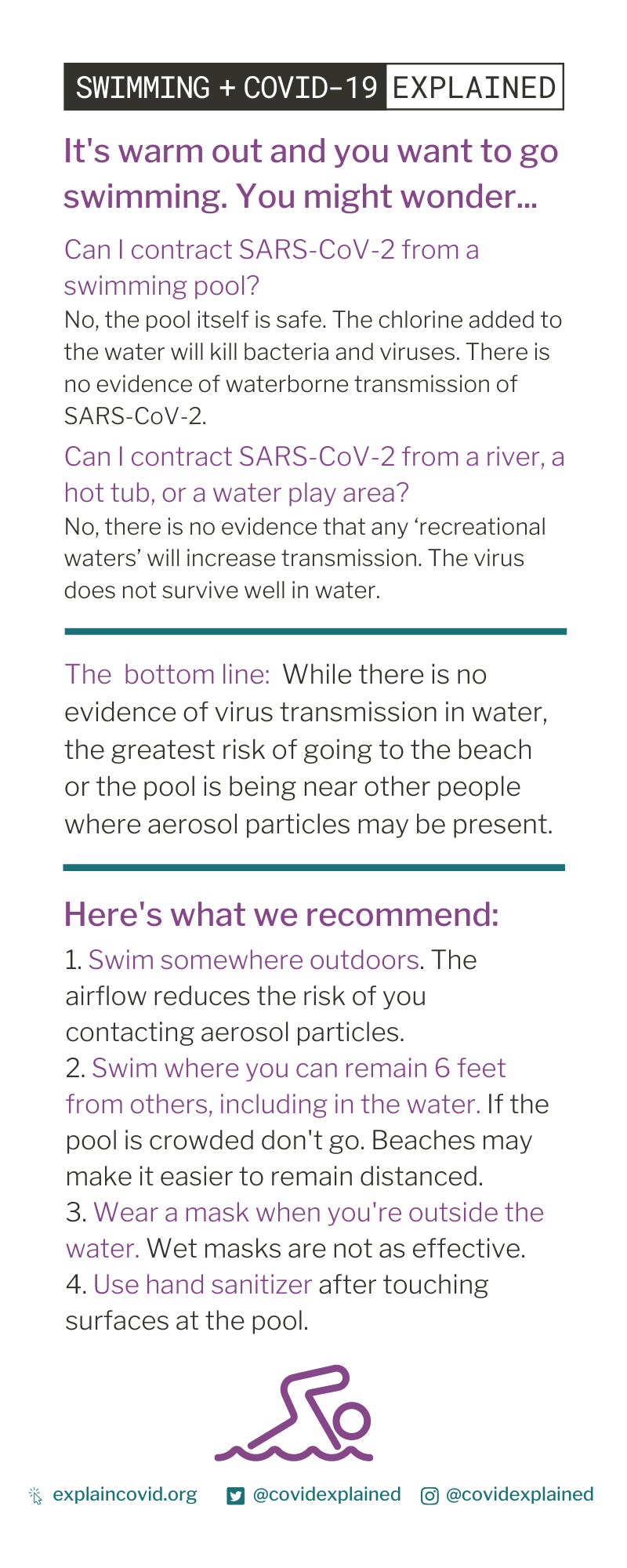COVID-19 is confusing. We are here with facts about the virus. How does it spread? How is it treated? Who does it affect most? Unbiased information to help you make good decisions...
COVID-19 is confusing. We are here with facts about the virus. How does it spread? How is it treated? Who does it affect most? Unbiased information to help you make good decisions...
COVID Explained
|
We’re in the swing of summer and about to enjoy a holiday weekend, so naturally, going swimming might seem like a tempting activity. Essentially, a water-based activity is just as risky as any activity involving other people. As we discussed in our Path of the Virus Explainer, the biggest problem is transmission from people through viral droplets, not through objects and surfaces such as pool water itself.

So let’s break down some questions about the risks of going swimming. Our guidelines are summarized in the following handy, very shareable infographic and in greater detail below.

Can I contract SARS-CoV-2 from a swimming pool? No, the pool itself is safe. The chlorine added to the water will kill bacteria and viruses. There is no evidence of waterborne transmission of SARS-CoV-2.
Can I contract SARS-CoV-2 from a river, a hot tub, or a water play area? No, there is no evidence that any ‘recreational waters’ will increase transmission. The virus does not survive well in water. We’ve talked about detection of SARS-CoV-2 in sewage water, but this comes from the fecal matter itself, and it’s not really a good idea to play anywhere that has raw sewage for many reasons.
Can I go to the beach? The beach actually might be safer than the pool because beaches are usually bigger. If there is more space at the beach and you can safely distance from other beach goers, transmission is less likely.
Should I go to the community pool? That depends on how busy your pool is and on how successfully you will be able to socially distance yourself from other people. For kids, part of the appeal of going to the pool is playing and hanging out with other kids. But social distancing still needs to be practiced to prevent transmission. If the pool is crowded and you can’t remain six feet apart, this is risky. If someone sneezes, coughs, or yells near you then the viral droplets are still transmitted even if you are in the water. Outdoor pools are safer than indoor pools because of the airflow. Similar to what we explained in our piece about gyms, the breeze will cause the virus particles to disperse, decreasing the likelihood that a droplet or aerosol loaded with virus particles will land in your nose, mouth, or eyes.
Do I need to wear a mask? Wearing a mask while at the pool but not in the pool is advised. A wet mask is not as effective so you shouldn’t wear it in the pool. But if you are sunbathing or hanging out outside the water, especially near other people, then you should wear a mask.
Should I bring hand sanitizer? Yes, the surfaces you touch could be a problem if there are a lot of other people touching them and sinks to wash hands aren’t accessible.
The CDC guidelines offer advice about preventing COVID-19 at aquatic centers, including guidelines that public pools will have to follow in order to open. In brief:
If you can keep 6 feet from people, a pool is no riskier than any other activity.
Whether or not to go really depends on how busy the pool is.
Add a mask and hand sanitizer to your beach bag.
This issue was adapted from a post on the site available here. Please feel free to share your thoughts, questions, and concerns — you can get a hold of us via email, Twitter, Instagram, and the site itself.